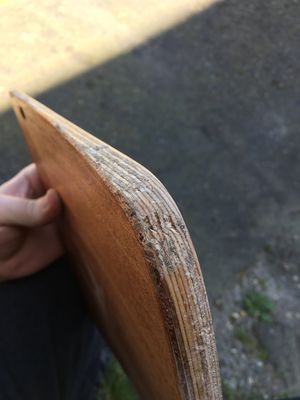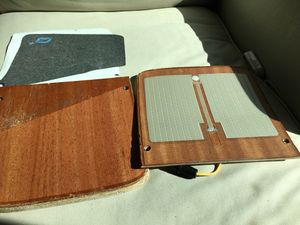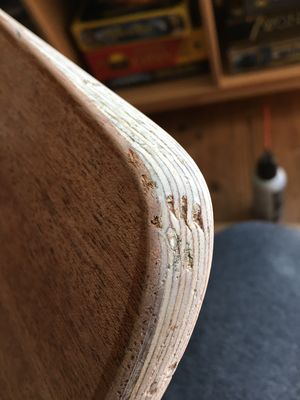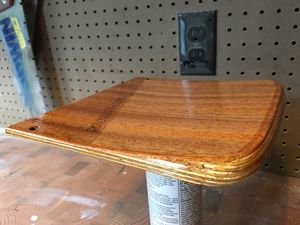Difference between revisions of "Waterproofing your Foot Pads"
| Line 1: | Line 1: | ||
[[File:Waterproofing pad 0.jpg|thumb|Example of a damaged footpad which is no longer resistant to water damage.]] | |||
⚠️ WARNING: MAY VOID YOUR WARRANTY. | ⚠️ WARNING: MAY VOID YOUR WARRANTY. | ||
The [[Onewheel+]] comes from the factory with a coat of Oil-Based Polyurethane. This is what makes your foot pads resistant to water. This coating however will wear off over time and after an impact. Once the varnish is removed and bare wood fibers are exposed, the footpads are no longer protected against mold and mildew which could make the wood swell or even rot. | The [[Onewheel+]] comes from the factory with a coat of Oil-Based Polyurethane. This is what makes your foot pads resistant to water. This coating however will wear off over time and after an impact. Once the varnish is removed and bare wood fibers are exposed, the footpads are no longer protected against mold and mildew which could make the wood swell or even rot. | ||
__TOC__ | __TOC__ | ||
Revision as of 07:00, 17 September 2017
⚠️ WARNING: MAY VOID YOUR WARRANTY.
The Onewheel+ comes from the factory with a coat of Oil-Based Polyurethane. This is what makes your foot pads resistant to water. This coating however will wear off over time and after an impact. Once the varnish is removed and bare wood fibers are exposed, the footpads are no longer protected against mold and mildew which could make the wood swell or even rot.
Maintaining the original look of the footpads
In this tutorial we will cover how to do a "touch up" to maintain the water resistance of your foot pads by reapplying some polyurethane or spar urethane onto the footpads. It is important the Urethane or Polyurethane you are using is Oil based.
Clear epoxy could also maintain the original look however its application is a lot more complex.
Supplies
- Oil-based Polyurethane or Spar Urethane
- Sandpaper in different grits:
- 100-180 grit to smooth out cracks and dents
- 240-800 grit for finishing
- (Optional) Carpenter's Wood Filler, stainable if possible
- Mineral spirits or paint thinner (for cleaning the brushes)
- Paint brushes
Instructions
1. (Optional) Remove the grip tape (see Grip tape replacement for instructions) from the footpad(s). For a simple "touch up", you could leave the grip tape in place.
2. Sand down the imperfections to obtain a smooth surface (start with the lower grit).
3. (Optional) Fill the holes in the wood with some Carpenter's Wood Filler according to the instructions. Let dry then sand to the appropriate shape.
4. Sand down the entire area where you'll apply the varnish (to ensure the coating "sticks").
5. Apply the polyurethane or (spar) urethane following the manufacturer's instructions.
6. Re-apply as many layers as desired, making sure the layers are completely dry before applying a new coat. If a coat has been drying for over 12 hours, lightly sand before re-coating:
7. You're done! Wait for the varnish to thoroughly dry (24-72 hrs) prior to use. If you removed the grip tape in step one, now you can install a fresh set! Make sure your brushes are clean and dry!













